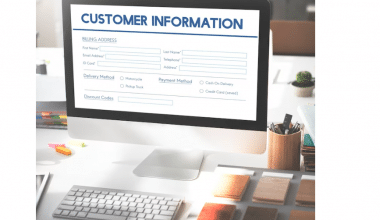Data regarding client interactions is gathered using a customer relationship management (CRM) system. This information is gathered from several sources and kept in a centralized database, including customer support records, reviews, the official website of the company, and relevant social media platforms. In order to improve on its products and services, respond to customer issues, and eventually spur growth, the corporation can examine this data. As a realtor, CRM real estate is also something you need. Another example of this software is CRM Salesforce. In this post, you’ll learn about the top 10 CRM software.
CRM System
For small organizations in the beginning phases of growth, CRMs are essential. This is so because the number of clients these companies can attract and keep is crucial to their success. For instance, a newly opened diner wants to know what customers think of the food, what kind of online reviews they’re leaving, potentially influencing other customers, and whether or not they plan to return. With the use of all this data, the restaurant can improve its offerings, deal with any issues, and increase patron happiness. There are many CRMs depending on the needs of your business. There are 3 main types of CRM:
- Operational
- Analytical
- Collaborative
Who Uses CRM?
CRM is typically used by:
- Real estate agents and brokers
- Marketing Companies
- Sales-based companies
- Businesses that create quotes and invoices such as contractors
- Insurance companies
- Hotels and the hospitality industry
- Retail businesses
Top 10 CRM Software
Cost, functionality, setup, and integrations are just a few things to think about when selecting customer relationship management software for your company. As there are so many options available, we looked into and evaluated many of the top platforms to find out which ones we believed would be the most beneficial for different business requirements.
#1. Salesforce CRM
Salesforce is a well-known market leader in the CRM space and provides a well-liked platform with the bare minimum features, making it perfect for start-ups and small enterprises in expansion. It offers a wide range of specially designed solutions for sales, marketing, and customer support teams for those prepared to advance and delve deeper into CRM capabilities.
#2. Agile CRM
Our choice for the best customer relationship management system for all types of small businesses is Agile CRM due to its strong features and vast automation possibilities. Even the free version of Agile CRM comes with a ton of functionality, such as 50,000 contacts and companies, email tracking, and two-way email connection.
Paid plans include a variety of services that are charged per user and offer discounts for longer contracts. Builder tools for a variety of services, including forms, e-mail templates, and website landing pages, will be very useful for marketing teams. As well as monitoring social media, you may automate marketing chores.
#3. Monday Sales CRM
Monday Sales CRM is an excellent project management option for companies with countless, complicated projects and apparently infinite sales duties. The main platform for job management offers vital time-saving and organizational features. Customers of Monday Sales CRM benefit from infinite boards for project organization and user-friendly interfaces. Whether you require a customized dashboard for certain communication requirements or want to dive into analysis with customer data visualization capabilities, Monday Sales CRM delivers straightforward technology to help your success. The fundamental work management platform stands out for its deliberate design, adaptability to any workflow, and scalability.
#4. Zoho
Zoho is a name that requires no introduction when it comes to business management solutions. From payroll solutions to collaboration apps to accounting tools, the company’s portfolio has it all. Zoho CRM is ideal if you don’t want the headaches of a self-hosted CRM solution. Zoho is an online CRM with many channels that collects client information from a range of channels, like calls, emails, live chats, and social media. Every customer receives real-time data and notifications through its SalesSignals feature. Each team member can be given a specific goal, and you can track their development from a centralized dashboard.
With the use of Zoho CRM tools, you can design and automate sales processes and even construct customized customer portals. It is possible to create specialized integrations and solutions thanks to the REST API and its libraries.
#5. PipeDrive
Pipedrive is a superb CRM option for companies that require a strong visual sales pipeline with information that can be seen quickly and data visualizations. With its visual tools, each opportunity is simple to understand, and its drag-and-drop interface makes it simple for team members to take action on the tasks that are mission-critical and marked on the dashboard. You can streamline your current workflow systems and enhance departmental operations with customizable pipelines and fields. Pipedrive also enables you to interact with clients and team members while on the go thanks to a strong mobile app.
#6. HubSpot
Due to its scalability and ability to manage an increased volume of client interactions, HubSpot is a good option for growth-oriented small enterprises. It is hence our choice for scalability. Via a visual dashboard, HubSpot gives a constantly updated snapshot of your company’s sales funnel. In this section, you can organize appointments, monitor performance in relation to quotas, and more. All client interactions, including calls, emails, and interactions on social media, are automatically logged by the CRM, and this data can be simply synchronized to Gmail or Outlook.
Due to its timeline view, HubSpot makes it simple to keep track of all interactions with any lead. Personalized email sets can be scheduled, and you can get useful information about them. The marketing hub has a ton of tools that you can use to manage optimal landing pages, make email templates, and calculate SEO-based ROI.
#7. NetSuite CRM
A CRM platform that would enable mid-sized e-commerce businesses to better understand their consumers’ purchasing patterns is necessary because these businesses rely on recurring business from their clients. For business owners who wish to offer the greatest customer experience possible, Oracle’s NetSuite is a cloud-based ERP platform with CRM capabilities. The CRM module aids businesses in getting the most out of each client encounter at every point of contact. Marketing, sales, customer service, and technical support are just a few of the departments that NetSuite can coordinate, automate, and manage your client interactions. This implies that any employee can speak with any customer as though they have been the primary point of contact and have all relevant information since the first engagement.
#8. Freshsales CRM
The built-in tools provided by Freshsales CRM software are intended to optimize communications and provide a deeper understanding of clients. Based on previous sales data, actions, and engagement, Freddy, a sophisticated AI assistant, may assist you in building a deeper knowledge of your consumers. Along with a basic VoIP phone service that can be accessed from any device and offers toll-free local numbers in over 90 countries, Freshworks also includes an integrated phone system.
#9. Streak
The bulk of CRM systems isn’t precisely simple to start with because of the many interconnected modules that make them function. Streak CRM is one of the exceptions, although there are still several. What exactly distinguishes Streak as maybe the most user-friendly CRM available? The foundation of the system is Gmail, an application utilized by virtually everyone with access to the internet.
An email has become a CRM powerhouse right now thanks to Streak. Just install the extension, and you’re set to go. Streak enables effortless collaboration and lets you share everything from emails to notes with a single click. Google Calendar lets you handle orders, create wait lists for customer service, and schedule task reminders. Other features in the mix include mail merge, tracking, shared pipelines, and access to Webhook APIs.
#10. Insightly
Cost management is a constant source of stress for startups and other small enterprises. It’s essential to find a CRM solution that provides outstanding capabilities without breaking the bank, which is why Insightly is our choice for the greatest value.
Insightly is one of the greatest deals for CRM services available, with a base price of $29 per user per month when paid annually. You’ll have access to ten gigabytes of storage, can import twenty-five thousand records at a time, and obtain one hundred thousand records. In addition, task management, API access, and customized reports are included. With the option to connect to Microsoft’s Power BI business analytics solution, Insightly provides extensive report charts.
You can send 2,500 bulk emails every day for email marketing purposes with Insightly, and email scheduling is also an option. Project automation is facilitated by user access to pipelines, activity sets, Google Contacts, and Calendar sync, among other features. When it comes to third-party integration, Insightly’s open API enables frictionless connectivity with services like PieSync, Adobe Analytics, and BambooHR.
CRM Real Estate
As a type of customer relationship management (CRM), real estate CRM facilitates the administration of all interactions with prospective and existing clients. Every year, CRM solutions play a bigger role in both the performance of real estate agents’ brokerages and their everyday job. Real estate CRMs should offer click-to-call, lead follow-up, email, and text messaging.
Even though they weren’t designed expressly for the real estate sector, many of the CRM systems currently available to businesses may be tailored to meet the needs of real estate agents. Although some CRMs feature them, there are some tools that increase the CRM’s effectiveness for agents.
#1. Zillow Premier Agent CRM
You get “customer insights you can’t see anywhere else” with the Zillow Premier Agent CRM, according to the company. The CRM allows you to view your clients’ Zillow search activity, providing you with the data you need to provide them with the best possible service. Moreover, Zillow provides a free mobile app that enables you to manage your business while on the move and respond to prospects.
The productivity tools it offers are tasks, personalized notes, and reminders. If you use the Zillow CRM, there won’t be any competition because you’ll be the only agent that potential purchasers of your property see. The fact that this application only connects to Zillow and not any other residential real estate websites may be a drawback.
#2. Salesmate for Realtors
For sales, marketing, and customer experience teams, Salesmate is a flexible CRM & Automation Platform. Although many different businesses use the platform, the vast majority of its users are in the real estate industry.
Connecting Salesmate to various sources is simple, and you can import leads right into CRM. Once the leads are in, managing your deals and pipeline becomes simple. To close more business, you have access to all the communication tools you need in Salesmate. Automation of routine chores, communications, follow-ups, and marketing efforts are all possible with Salesmate.
#3. Apptivo
You can access your contact details, project management tools, invoicing systems, and email campaigns all in one location with Apptivo. With the aid of Apptivo, you can develop robust automation rules that both you and your clients will appreciate and have access to client data from any location.
Creating work orders, managing inventory, and assigning sales regions to agents are some more functions. Assigning leads and clients to your reps automatically can be done by setting up assignment rules.
#4. Bitrix24
A free CRM interface provided by Bitrix24 contains cutting-edge multimedia elements. With call-back forms, live video chat, social media messenger, and phone-in chat, realtors may speak with prospects and clients directly. In order to help you manage deadlines, Bitrix24 also includes pipeline management solutions that provide whole project visibility.
You can eliminate the tedious work involved in managing your pipeline with its ability to automate sales funnels. The ability to manage your marketing spending and determine the return on investment without installing an additional tool (available in the CRM+ special plan and Standard business plan) is another fantastic feature.
#5. Wise Agent
Smart Agent is a potent all-in-one CRM designed for realtors by agents, for agents. It can assist you in managing all aspects of your business in one location by providing seamless transaction management, sophisticated automation, time management capabilities, and a central database for all of your customer information. Smart Agent lets you automate lead classifications and contact assignments, create effective website landing pages, and centralize all your discussions.
Read Also: A Perfect Combination of Big Data and Real Estate
Boost Your Real Estate Company by Using a CRM
It’s not simply running a real estate company. It might be difficult to keep track of a large number of properties, an extensive portfolio of real estate listings, and a large number of contacts all in one location. A real estate CRM can help with that, though. You may increase customer communication while also using a CRM to speed up and simplify the sales process for you and your team.
How to Choose CRM Software
Looking for how to choose CRM software? Here is how to choose CRM software:
#1. Create a Budget
Setting your budget before you begin shopping is recommended because CRM expenses can range from nothing to more than $1,000 each month. Before delving deeper into feature sets and subscription plans, it is simpler to whittle down your selections by excluding CRM software that is out of your price range.
#2. List the Features
Even the most simple CRM system can be too complicated with all the features and capabilities available. List the CRM elements that are essential and those that are desirable but not necessary to ensure clarity. Now is a wonderful opportunity to solicit feedback from other employees who will use the CRM in your firm. They might suggest things you hadn’t considered or suggest removing characteristics you believed they would like.
#3. Request Recommendations from Similar Companies
It can be difficult to choose the best CRM in a market that is crowded with sales technology. Suggestions from insiders who understand the demands of your sector are priceless.
#4. Evaluation of the Marketplace
High-profile solutions you may have heard of in the past may no longer be the best option since the CRM industry evolves quickly as technology advances. The greatest places to go for guidance on starting a small business are trade magazines and websites.
#5. Review Articles
Consider reading any user reviews you come across as your selection of potential CRM candidates expands. Reading about specific solutions on the websites of the suppliers won’t provide you as much insight into how they work in practice.
#6. Verify Your Top Choices
Now that you know what to look for in CRM software, try them all out and see which one works best for you. Before investing money in a long-term solution, test as many of the companies’ free trials as you can. Nevertheless, keep in mind that it’s their responsibility to put their CRM in the best possible light, so utilizing the program yourself is the best way to test it. Sales representatives are typically glad to answer any questions you have or give you a sample of their product.
#7. Reach a Conclusion
Making a decision is time-consuming, so do it after doing your research. Even though it can take some time to complete all of these processes, it will be time well spent on such a significant investment.
What Is CRM Mainly Used For?
CRM is a tool that organizes all of your business’s interactions and relationships with current and potential clients. To strengthen commercial ties and expand your company, the objective is straightforward.
What Kind of Job Is CRM?
Systems for managing client relationships aid organizations in comprehending how consumers interact with brands. As a result, many businesses are developing positions to supervise the efficient operation of CRM systems across businesses.
What Are the Five 5 Benefits of CRM?
Here are the five benefits of CRM:
- Trustworthy reporting.
- Dashboards that visually showcase data.
- Improved messaging with automation.
- Proactive service.
- Efficiency is enhanced by automation.
Final Thoughts
Your firm may develop, become more efficient, and maintain organization with the aid of a CRM. It can assist you to remember crucial dates and follow-ups and free up time for you to do chores that will generate income. A CRM is typically cost-effective if you work full-time in a field where it can be useful. Starting with a less expensive CRM alternative and working your way up is always a possibility if you’re just getting started or have a tight budget.
Related Articles
- The Top Best SMALL BUSINESS CRM SYSTEMS in 2023 (Updated)
- CRM Tools For Small Businesses: Free Tools And Application
- What is Customer Relationship Management Tools: Definition, Process and Examples
- CUSTOMER RELATIONSHIP MANAGEMENT SYSTEMS: Definition, Examples & Best Strategies
- Best 10 Customer Relationship Management (CRM) Software For Businesses
- CLICK FUNNEL: What Is It, How to Create It & Review






